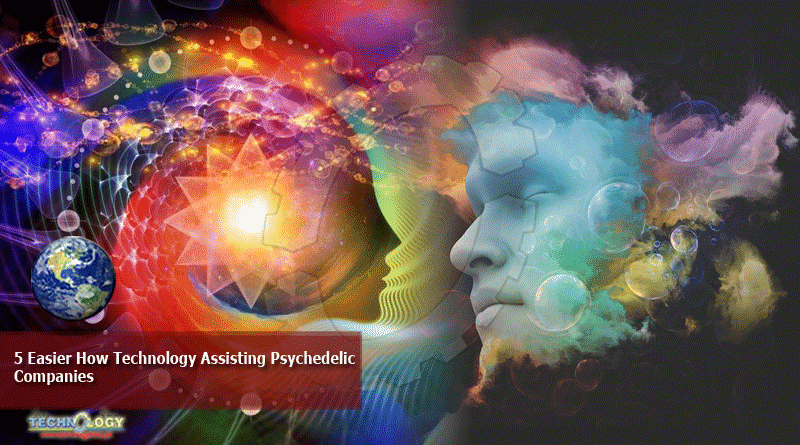Psychedelic Companies Have Successfully Raised Hundreds Of Millions And Launched Dozens Of Clinical Trials. Regulatory Changes Seem…

closer than ever before.
Since the start of 2020, we have seen major changes to our society as the pandemic has disrupted the world, and people are getting used to accepting a “new normal.” This might explain the new mainstream acceptance of the burgeoning psychedelics movement. Psychedelic companies have successfully raised hundreds of millions and launched dozens of clinical trials. Regulatory changes seem closer than ever before.
Technology has played a large role in this growth. Here are five ways.
1. Tech enables decriminalization movements.
People have used psilocybin and other psychedelic medicines for thousands of years in medicinal and ceremonial settings, but our governments criminalize them. Now technology allows people greater access to information and the ability to gathering in online forums on social media to support decriminalization initiatives across North America. In June, Oregon made history by gathering 38,000 signatures and allowing citizens to vote on legalizing “psychedelic plant medicines.” The activists behind the movement were impacted by social distancing. Still, they were able to use the power of the internet to meet the threshold needed and are now awaiting the historic decision of the citizens of Oregon.
2. Tech expands virtual treatments.
The pandemic has caused a massive acceleration in mental health problems and the use of telehealth. Consumer adoption has skyrocketed, from 11 percent of US consumers using telehealth in 2019 to close to half of the population now using telehealth to replace in-person healthcare visits. Forrester Research projects virtual health interactions will top 1 billion by years end putting pressure on existing Psychedelic Companies to meet the demand.
There is currently no convenient way for people to find expert mental health professionals to help them with their psychedelic healing. I have been working for the last year with clinical psychologists, neuroscientists, and software developers to launch Mindleap Health the world’s first telemedicine platform for psychedelics.
Psychedelic experiences are often dream-like and can involve intense visions, feelings, or thoughts that are hard to fully understand during the experience itself. Integration (or aftercare) specialists help people to process what they’ve encountered during a psychedelic trip and use it to enact meaningful change in their lives. The Mindleap platform is making it easier for people to receive psychedelic-related care without breaking any laws. As the regulatory changes happen, more people will have the opportunity to access virtual treatments right from their smartphones and the comfort of their homes.
3. Tech creates online communities.
Since the start of the year, dozens of virtual conferences have taken place, allowing people to connect and hear from industry pioneers. Topics have ranged from decriminalization to investing, to creating diversity and inclusion. The Virtual Psychedelic Conference, hosted by The Conscious Fund and Microdose.Buzz in April was the largest ever virtual event in psychedelics. It featured speakers like renowned neuroscientist Robin Carhart-Harris, visionary ethnopharmacologist, author Dennis McKenna, and celebrity mycologist and researcher Paul Stamets.
4. Tech builds virtual realities.
After a slow build over the past few decades, we have finally gotten to a point where virtual reality headset adoption has reached critical mass. The ability to record heartbeat and rhythm using wearables, facial tracking from the VR headset, and incorporating a user-controlled “ideal” setting may mean that psychedelic treatments of the future could all be done in virtual reality.
Earlier this year, developers commissioned by the National Gallery of Australia created a game called terminus. This psychedelic virtual reality experience takes you through five psychedelics worlds, which are hard to explain without seeing them for yourself. And if that doesn’t seem close enough to the real thing, researchers at Cornell demonstrated in February that specific virtual reality experiences could enable life-altering changes “comparable to those reported in double-blind clinical studies after high doses of psilocybin and LSD.” Within the multiplayer VR journey, participants experience “the collective emergence, fluctuation, and dissipation of their bodies as energetic essences.” The paper on the study is titled “Isness: Using Multi-Person VR to Design Peak Mystical-Type Experiences Comparable to Psychedelics,” and is a decisive step towards virtual psychedelic therapies.
5. Tech improves access to education.
There has been a massive increase in virtual education programs aimed at training mental health professionals to safely and effectively utilize the power of psychedelic-assisted psychotherapy. Psychedelic Companies like Fluence, Psychedelics Today, Double Blind, and Psychedelic Support all have online courses that allow practitioners to grow their careers and provide psychedelic integration and therapy services to clients. Even resources help the everyday person learn more about specific psychedelics, their effects, and how to use them correctly. The Third Wave offers guides to more than a dozen popular psychedelics, and for those curious about the history of psychedelics as medicine, my company has created a neat timeline on the topic.
Technology-driven disruption is not new, and we are witnessing that new technologies have emerged and fundamentally changed the way we live over the last decade. The combination of technology and psychedelic medicine has the potential to have a massive effect on the wellbeing of millions of people around the world, and it is exciting to watch it all unfold.
This news was originally published at greenentrepreneur.com
